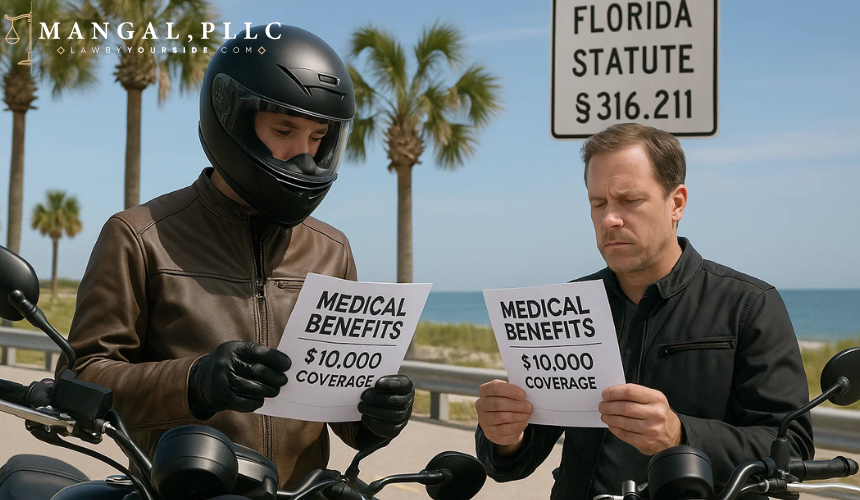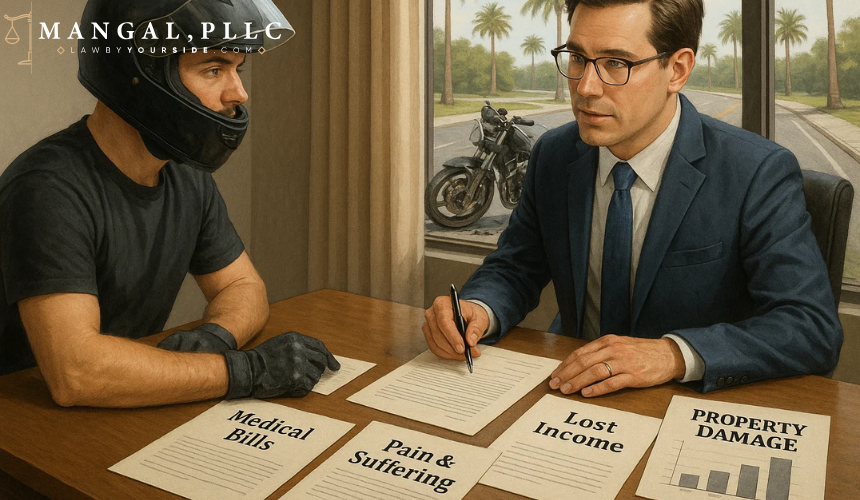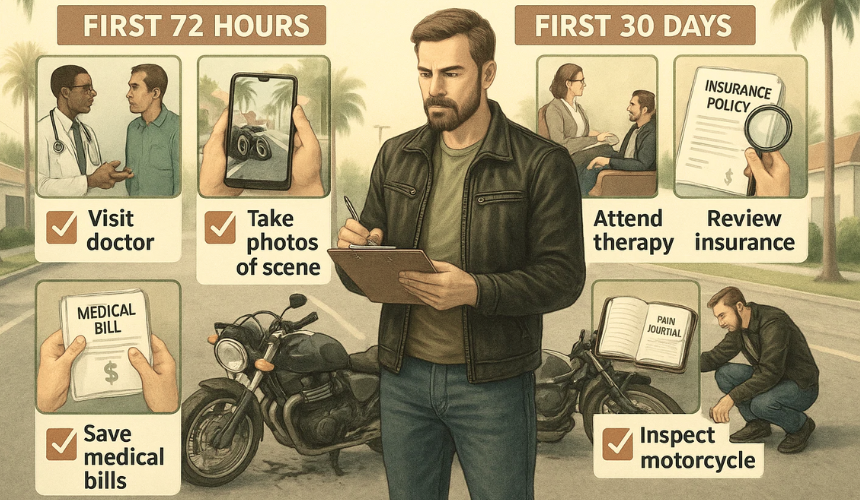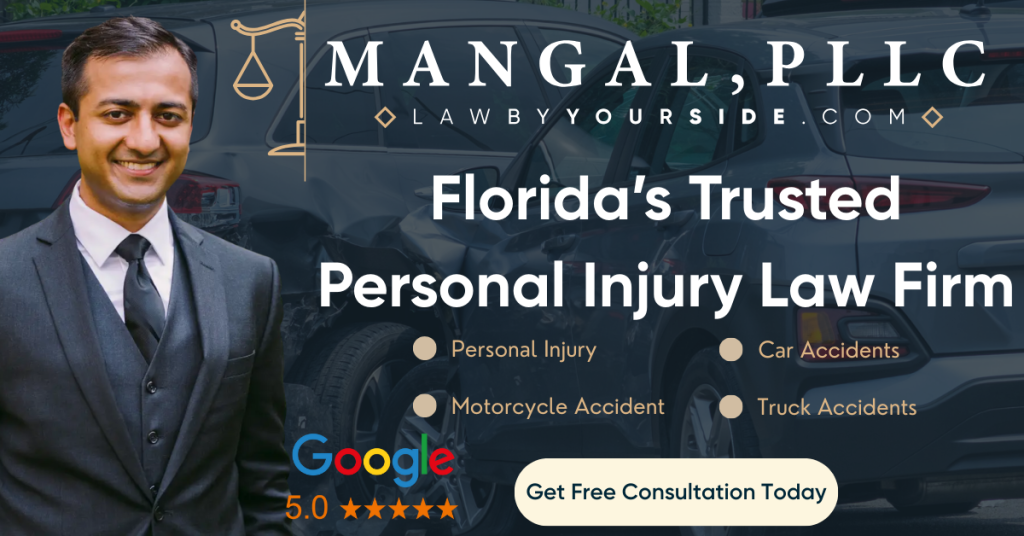You’re out early, cruising through Clermont with nothing but the hum of the bike and the open road ahead. Then a car turns out of nowhere. You try to put the brakes, but it’s too late. The jolt throws you forward, and the noise fades to silence. Moments later, you’re on the ground. Your bike is wrecked, and pain starts to set in. The driver keeps saying they didn’t see you. Then come the sirens, the hospital bills, and the insurance calls before you’ve even had time to breathe.
Many Florida riders try to handle things on their own, trusting the insurance company to do what’s fair. But motorcycle accidents aren’t simple. Riders don’t have automatic Personal Injury Protection coverage, and every dollar you recover depends on proving fault and documenting your losses.
At MANGAL, PLLC, we’ve helped riders across Central Florida rebuild after devastating crashes. We handle the legal fight so you can focus on healing. Whether your accident happened in Clermont, Orlando, or anywhere in Florida, getting the right advice early can make all the difference.
Why do Florida motorcycle accident claims work differently from car claims?
Motorcycle accidents in Florida don’t work under the same rules as car crashes. Drivers use their Personal Injury Protection coverage, called PIP, for medical bills and lost wages. Riders don’t. Even if you have an auto policy, it won’t cover you under Florida’s no-fault system.

That means you can’t count on your own insurer to step in after a crash. Instead, you have to pursue a claim against the at-fault driver or rely on other coverage such as health insurance, MedPay, or Uninsured and Underinsured Motorist protection.
This catches many riders off guard. Without PIP, you’re immediately dealing with medical bills, missed income, and adjusters who start questioning who caused the crash. Insurance companies know your claim could be significant, and they often look for ways to reduce it.
Our motorcycle accident lawyer in Florida can help by:
- Finding every available source of coverage, including the driver’s policy, UM or UIM coverage, MedPay, and your health insurance.
- Proving the other driver’s negligence and countering unfair assumptions about motorcycle riders.
- Organizing medical bills and insurance liens so you don’t get buried in paperwork.
- Gathering the right evidence to show exactly how the crash happened.
We’ve seen insurance companies blame riders just for being on a motorcycle. We push back with evidence, photos, and expert analysis. The truth matters, and we make sure it’s heard.
When is it smart to call a motorcycle accident lawyer right away?
If you were injured in a Florida motorcycle crash, it’s usually smart to call a lawyer as soon as you’ve seen a doctor — often within days, not weeks.

You should get legal help immediately if:
- You were seriously injured or required hospital care.
- Fault is disputed, or the police report doesn’t reflect what really happened.
- The insurance company asks for a recorded statement.
- You get a fast, low settlement offer that doesn’t cover your bills.
- The other driver was uninsured, distracted, or impaired.
- Your bike is totaled or you’re struggling with medical expenses.
- The crash involved multiple vehicles or a hit-and-run.
How do Florida helmet and insurance rules affect your claim?
Florida’s helmet laws are unique, and they can affect your motorcycle accident claim.
Under Florida Statute §316.211, riders over 21 can legally ride without a helmet — but only if they carry at least $10,000 in medical benefits coverage. Riders under 21 must wear helmets, no exceptions.

If you weren’t wearing a helmet during the crash, you can still file a claim and recover damages. However, if not wearing one made your injuries worse (for example, a head injury), the insurance company may argue that you share some blame — a tactic called comparative negligence.
Here’s what matters most for riders:
- Helmet use affects damage calculations, not your right to file a claim.
- Eye protection is always required in Florida.
- MedPay or UM/UIM coverage can fill the gap if you don’t have medical benefits.
- Document your medical treatment early — insurers look for gaps to reduce value.
Our Clermont motorcycle accident lawyer can help prove that the other driver, not your helmet choice, caused your injuries.
How does Florida’s comparative negligence rule affect your motorcycle claim?
Florida follows a modified comparative negligence rule. In simple terms, your share of fault affects how much you can recover after a crash.
If you’re 50% or less at fault, you can still get compensated — but your payout drops by that percentage. If you’re more than 50% at fault, you can’t recover anything.
For example, if your case is worth $100,000 and you’re found 20% responsible, you’d receive $80,000.
Insurance companies use this rule to their advantage. They’ll try to say you were speeding, changing lanes too fast, or not visible enough. Even small details can reduce your claim.
A Florida motorcycle accident lawyer can help protect your side by:
- Reconstructing the crash with experts.
- Analyzing road and vehicle evidence.
- Securing video footage before it’s lost.
- Gathering witness statements early.
Strong evidence keeps insurers from shifting blame and helps you recover what you truly deserve.
What compensation can Florida motorcycle riders recover after a crash?
Motorcycle accidents often cause severe injuries—broken bones, brain trauma, and long recoveries. The law lets you pursue both economic and non-economic damages, depending on the impact of the crash.

Here’s what you can claim:
Economic losses (things with a dollar amount):
- Medical bills for hospital care, rehab, therapy, and future treatment.
- Lost income and reduced ability to work.
- Repair or replacement for your motorcycle and damaged gear.
- Out-of-pocket costs like medication, travel, or home help.
Non-economic losses (the human side of injury):
- Pain and suffering.
- Emotional distress and anxiety.
- Loss of enjoyment of life.
- Scarring or disfigurement.
In rare cases, punitive damages apply if the driver acted recklessly—like speeding through a red light, texting behind the wheel, or driving under the influence.
At MANGAL, PLLC, we calculate your claim based on real numbers, expert opinions, and medical evidence, so no insurer can undervalue your pain.
Which insurance coverages matter most for Florida riders?
Because motorcycles aren’t covered by Florida’s no-fault system, insurance protection comes down to what you personally choose to carry. If you’re a rider, a few coverages are critical.

Key protections that can save your claim:
- Bodily Injury (BI) liability: Covers injuries you cause to others. The at-fault driver’s BI coverage pays your medical bills if they caused the crash.
- Uninsured/Underinsured Motorist (UM/UIM): Steps in when the driver who hit you has little or no insurance. This coverage can mirror your BI limits—and in Florida, it’s a lifesaver.
- Medical Payments (MedPay): Covers your medical bills right away, regardless of fault.
- Collision and property damage: Pays for repairs or replacement of your motorcycle.
- Stacked UM/UIM: Lets you combine coverage across multiple bikes or vehicles, increasing your protection limits.
Many riders only realize how valuable UM/UIM is after the crash—especially when the at-fault driver has state-minimum coverage or none at all.
Our Florida motorcycle accident lawyers at MANGAL, PLLC always review your policy for hidden protections that insurers won’t mention. You might already have coverage that can double or triple your recovery.
What evidence should you lock down in the first week after a motorcycle crash?
The first few days after a Florida motorcycle crash are the most important. Evidence disappears fast — skid marks fade, traffic cameras record over footage, and damaged bikes get repaired or scrapped. If you wait too long, it can be impossible to prove what really happened.
Here’s what you (or your lawyer) should gather right away:
- Crash photos: Take clear pictures of your bike, the other vehicle, the road, and any debris.
- Scene details: Note weather, lighting, and traffic conditions.
- Witness contacts: Get names and numbers while they still remember.
- Police report: Request a copy and check for errors.
- Medical proof: Keep ER records, X-rays, and treatment notes tied to the crash.
- Damaged gear: Don’t throw away your helmet, gloves, or jacket. They show the force of impact.
- Video evidence: Save dash-cam, security, or traffic cam footage — it’s often overwritten within days.
We send legal notices to prevent data deletion and track down every detail that builds your case.
What should you do in the first 72 hours — and the first 30 days — after a crash?

The first few days after a motorcycle crash can feel like a blur. But what you do during this time shapes your entire claim. Missing simple steps can weaken your case or reduce your payout.
Your 72-hour checklist:
- Get medical care immediately. Even if you feel fine, hidden injuries are common.
- Tell the doctor it was a motorcycle crash. It ties your records to the event.
- Notify your insurer — but keep it brief and factual.
- Collect and save everything: photos, reports, hospital bills, and prescriptions.
- Don’t post on social media about your injuries or the crash.
Your 30-day checklist:
- Follow every medical referral. Don’t skip therapy or doctor visits.
- Save all out-of-pocket receipts: meds, travel, parking, or home help.
- Get your bike inspected and consider a diminished value claim.
- Review your policy for UM/UIM and MedPay coverage.
- Keep a short pain journal to show daily challenges.
Contact our motorcycle accident lawyer before speaking to adjusters.
How does a Florida motorcycle accident lawyer increase your recovery?
Hiring a lawyer isn’t just about filing paperwork. It’s about protecting your evidence, maximizing your payout, and keeping you from being cornered by insurance tactics.
Here’s how a good lawyer changes your case:
- Stops insurer pressure: Adjusters can’t contact you directly once you’re represented.
- Builds medical proof: Links your injuries to the crash for full compensation.
- Finds hidden coverage: Checks every policy layer, including UM/UIM and umbrella coverage.
- Protects your net: Negotiates medical liens and bills so more money stays in your pocket.
- Manages timing: Files demand letters and negotiations when your treatment is stable.
- Prepares for trial: Strong preparation leads to higher settlements.
Florida motorcycle cases often involve serious injuries and high-dollar policies. Insurance companies defend those hard. You need a lawyer who can fight back.
What common mistakes quietly hurt motorcycle accident claims?
After a motorcycle crash, small mistakes can cause big losses. Many riders don’t realize how their actions—or inaction—can weaken their case.

Here are some of the most common errors we see in Florida:
- Waiting too long to see a doctor.
If you delay medical care, the insurer will argue your injuries aren’t serious or unrelated to the crash. - Giving a recorded statement to the insurance company.
Adjusters are trained to ask questions that shift blame or limit payouts. Talk to a lawyer first. - Posting about the crash online.
Even innocent photos or comments can be used against you. Stay quiet until your case is resolved. - Accepting a fast settlement.
Early offers rarely include long-term costs like therapy or surgery. Once you sign, you can’t reopen the claim. - Not hiring a lawyer soon enough.
Trucking and insurance teams move fast. Without a lawyer, key evidence can disappear.
You need someone to protect you from these traps.
FAQs About Motorcycle Accidents in Florida
Do I really need a lawyer after a motorcycle accident?
Yes. Florida motorcycle laws are complex, and you don’t get PIP coverage like car drivers. A lawyer helps you find coverage and prove fault.
Can I still recover damages if I wasn’t wearing a helmet?
Usually yes. Helmet use can affect how damages are calculated but doesn’t bar your claim.
What if I was partly at fault?
You can still recover money if you were 50% or less responsible. Your compensation is reduced by that percentage.
How long do I have to file a lawsuit?
Most injury cases in Florida must be filed within two years from the crash date.
What insurance applies if the driver who hit me has none?
If you bought Uninsured/Underinsured Motorist (UM/UIM) coverage, your own policy can pay your claim.
How much is my motorcycle case worth?
That depends on your injuries, treatment, fault percentage, and coverage. A lawyer can calculate the full value based on medical and financial losses.
What should I do first after a crash?
Get medical help, report the crash, take photos, and call a lawyer before giving any statements.
Key Takeaways for Florida Riders
- Motorcycle accidents don’t fall under Florida’s no-fault system.
- You must prove fault to recover medical and financial damages.
- Evidence fades fast — act quickly after the crash.
- UM/UIM coverage can protect you when others are uninsured.
- Helmet laws affect damages but not your right to compensation.
- The two-year injury deadline is strict — don’t wait.
- A lawyer protects your rights and increases your final recovery.
Ready to Talk to a Florida Motorcycle Accident Lawyer?
After a motorcycle crash, you don’t have to handle everything on your own. At MANGAL, PLLC, we’ve helped riders throughout Clermont, Orlando, and across Central Florida rebuild after serious motorcycle accidents. We take on the insurance companies so you can focus on healing and getting your life back.

Our firm has been voted the #1 Injury Firm in Central Florida and holds 5-star ratings on Google and Avvo. We’re proud of that reputation because it reflects the care and commitment we bring to every case.
When you call, you’ll speak directly with an attorney who listens, explains your options clearly, and fights for the best outcome.


